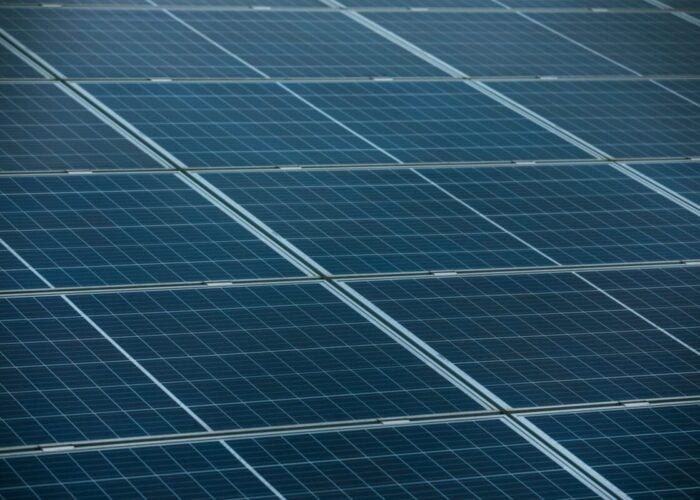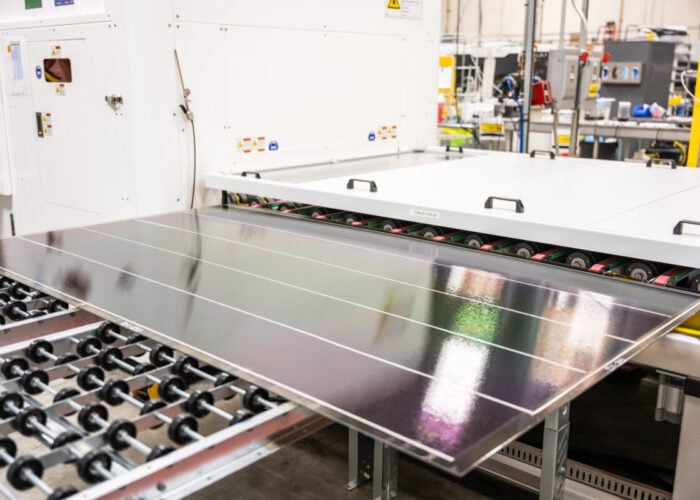
Avaada Electro, the manufacturing arm of Indian renewable energy developer Avaada, has commissioned a 1.5GW module assembly plant in Noida, in the northern Indian state of Uttar Pradesh.
The facility was built in just three and a half months, and will produce bifacial tunnel oxide passivated contact (TOPCon) modules. The plant will have the capacity to build two types of cells, G12 (210mm) and M10 (182mm), with a respective annual nameplate capacity of 1.5GW and 1.2GW. In addition to using these larger cells, Avaada Electro’s modules will also have “advanced multi-busbar configurations”, of between 16 and 24 busbars each.
Unlock unlimited access for 12 whole months of distinctive global analysis
Photovoltaics International is now included.
- Regular insight and analysis of the industry’s biggest developments
- In-depth interviews with the industry’s leading figures
- Unlimited digital access to the PV Tech Power journal catalogue
- Unlimited digital access to the Photovoltaics International journal catalogue
- Access to more than 1,000 technical papers
- Discounts on Solar Media’s portfolio of events, in-person and virtual
“At Avaada, we are committed to excellence, ensuring our products uphold the highest quality standards (‘Zero Defect’) while having no negative impact on the environment (‘Zero Effect’),” said Vineet Mittal, chairman of the Avaada Group, who referred to the ‘Zero Defect, Zero Effect’ principle of the Indian government’s Made In India programme, which encourages manufacturers to build products with no defects, and ensure manufacturing processes have no negative effects on the environment.
“Our goal is to establish a cutting-edge research and development (R&D) ecosystem in Noida, driving continuous innovation and strengthening India’s leadership in clean energy and sustainable manufacturing,” added Mittal.
The Avaada Group’s latest project falls under the Made In India programme, launched by prime minister Narendra Modi when he took office in 2014. The initiative has sought to expand the Indian manufacturing sector, across a range of industries, and has helped drive up foreign direct investment in the space, which increased from US$45.1 billion in 2014-15 to US$70.9 billion in 2023-24.
The solar sector, in particular, has benefitted from this approach, with a number of new manufacturing facilities commissioned or announced in recent months. Last week, Goldi Solar launched an AI-powered manufacturing facility, Eco Solutions signed a deal to build a module and cell plant in Madhya Pradesh and Tata Power commissioned a 4.3GW factory in February.
Avaada to build additional 5GW module assembly plant
Avaada Electro also announced the start of construction on its next manufacturing plant, a 5GW module assembly plant under construction in the Ecotech-16 industrial district of Greater Noida. This “superfactory” will also produce modules that use TOPCon cells, although Avaada Electro has not yet announced a timeline for the commissioning of the facility, or further details on the products that will be produced.
The news follows the company’s announcement of a 5GW TOPCon cell plant, to be built in the state of Uttar Pradesh, last October, as the company looks to expand its manufacturing presence in India.
The Avaada Group is just one of several Indian companies to have invested in cell manufacturing since the Ministry of New and Renewable Energy (MNRE) announced last year that it would add cells to its Approved List of Modules and Manufacturers (ALMM) from June 2026, a key piece of legislation that sets out the rules by which solar projects can benefit from government projects. From summer 2026, to be eligible for government projects, a solar plant must source all of its cells and modules from companies on the ALMM, which are predominantly Indian manufacturers, as the government looks to expand its domestic manufacturing sector.
“This initiative not only strengthens our state’s contribution to renewable energy but also drives employment and supports our vision of a US$1 trillion economy,” said Uttar Pradesh chief minister Yogi Adityanath Ji. “Avaada’s commitment to sustainability and innovation aligns with our goal of making Uttar Pradesh an industrial powerhouse.”







